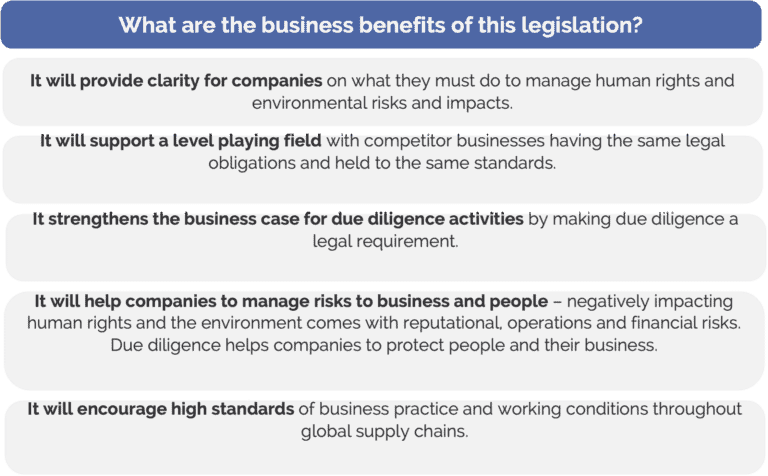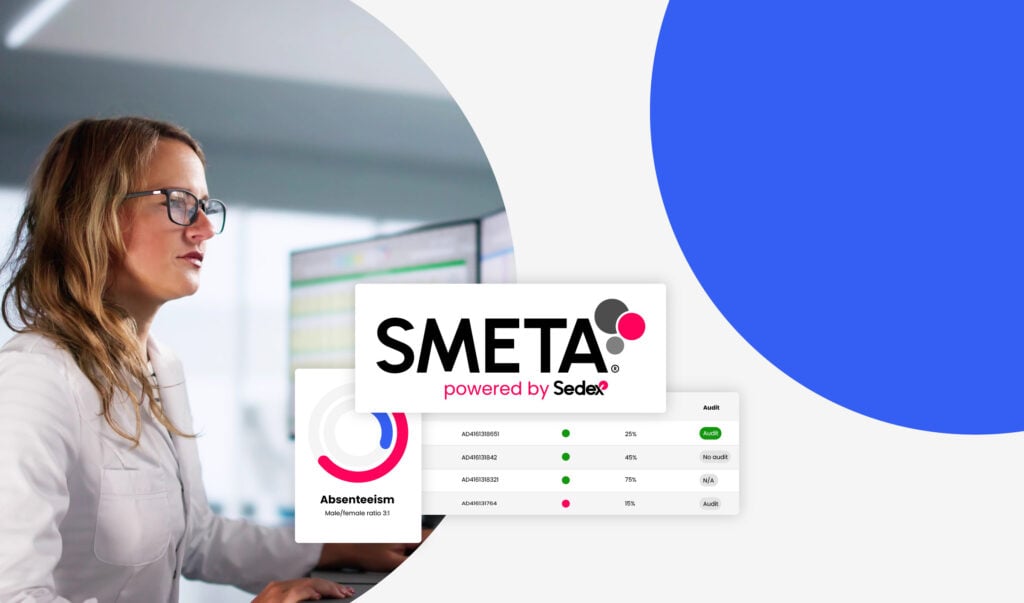Proposed EU legislation on sustainable corporate governance: Sedex contribution
This year the European Commission is looking to introduce a new law that requires companies to conduct due diligence around human rights and the environment. Sedex believes this is an important development for responsible sourcing and business practices.
The EU’s new legislation will ask companies to do more to identify, prevent and address the negative human rights and environmental impacts in their activities. It is likely that these requirements will apply to companies’ own operations and their supply chains.
Sedex has participated in the Commission’s public consultation on this to represent our members’ needs, contribute to the discussion and drive responsible business practices.
Read more about why we’re doing this and what the legislation is
Sedex’s recommendations and considerations
The requirements outlined in the new legislation should support a holistic perspective.
We believe it is critical that human rights and environmental considerations are integrated into business strategies, to unite financial, social and environmental goals. The EU legislation should require companies to do this by creating clear policies and targets to be defined by company directors.
A holistic, integrated approach will help companies to ensure different policies and performance targets do not work against each other. Managing social and environmental risks, including prevention and remediation, is at its most effective when policies, goals and procedures are aligned throughout an organisation.
In a snapshot survey with our members[i], 90% of those who responded agreed that business leaders should make sure a company’s activities balance the interests of investors, employees, local communities, supply chain workers and the environment.
New human rights and environmental requirements for businesses should align with existing guidance and frameworks.
Sedex agrees with the European Commission’s stated approach[ii] to align the requirements of new legislation with existing frameworks for responsible business conduct.
We believe it is important to align legal requirements with existing guidance – such as the UN Guiding Principles for Business and Human Rights (UNGPs), the OECD Guidelines, and the conventions of the International Labour Organization (ILO) – at every opportunity.
Aligning with existing goals and best practice will:

This will help businesses to comply with the legislation – ultimately supporting a greater number of businesses acting responsibly, protecting human rights and the environment throughout their supply chains.
A risk-based approach should underpin due diligence requirements.
Sedex recommends that the EU legislation takes a risk-based approach to due diligence requirements. The legislation should apply across all sectors, with any additional sector-specific requirements also being based on the severity of risk to human and environmental rights.
For example, a goal such as eliminating forced labour – with requirements for effective due diligence regarding this issue – should apply to all businesses. But the legislation might outline additional requirements for due diligence regarding health and safety risks in agriculture, mining and construction sectors, which the ILO defines as the three most hazardous sectors for workers.
In line with the UNGPs, we agree that the action companies are required to take should depend on their involvement in a likely or actual negative impact[i].
It is essential that the new legislation is supported by effective, accessible support and guidance for businesses.
Providing support and guidance will be key to the success of the legislation and adherence to it. It is crucial in helping companies translate due diligence criteria into business practice and comply with the requirements of the legislation.
Guidance should include accessible, practical materials to meet different individuals’ and organisations’ needs. It should be produced in multiple formats, beyond long-form documents and heavily text-based reports, with clear and actionable advice. Such guidance will be particularly critical for small and medium enterprises (SMEs), who do not have the same resources as large organisations.
In consultation with our members, over 60% said that both a toolbox (with training and guidance materials) and a national helpdesk for businesses would support them with due diligence activities and preventing negative human rights or environmental impacts.

The legislation should require businesses to set clear targets, measure their performance, and communicate their progress publicly.
The proposed legislation is an excellent opportunity to encourage transparency, continuous improvement and measurable results regarding businesses’ efforts to prevent negative human rights and environmental impacts.
Requiring businesses to set and publicly report against targets encourages accountability. It also helps different stakeholders, including investors and consumers, to understand companies’ efforts and their performance against these targets. It is important that these requirements are regularly updated to encourage continued progress.
This legislation is also an opportunity to confirm common goals and outline what businesses should do to help reach these – e.g. the climate targets of the Paris Agreement, or eliminating child labour.
The legal requirements for businesses should be supported by other ways to protect human and environmental rights.
Due diligence requirements for businesses are not enough, on their own, to protect human and environmental rights.
Effective monitoring and enforcement of the new legislation will help to ensure compliance. These also promote a level playing field where companies have the same obligations to conduct due diligence and are held to the same standards. The EU could also consider what incentives can be introduced to encourage businesses to conduct effective due diligence.
Promoting collaboration between organisations and actively helping businesses to work together to find solutions to common challenges will help to address negative human rights and environmental impacts.
A supportive legislative environment for union and civil society activity is also key. Trade unions help employees to access their human rights, while advocacy organisations, consumer groups and others scrutinise corporate progress and establish benchmarks in human rights and environmental performance.
Finally, the EU should continue to use its global position to advocate for high standards of business practice and working conditions worldwide.
Sedex welcomes this legislation as an effort to support businesses in protecting human and environmental rights throughout their supply chains. We look forward to seeing the scope of the proposed legislation.
Contact us to learn more about managing human rights risks in your business.
[i] In January 2021 Sedex conducted a snapshot survey with members about the proposed EU legislation, receiving 29 responses
[ii] Question 15 in the European Commission’s public consultation on corporate human rights and environmental due diligence states, “Please note that all [possible] approaches are meant to rely on existing due diligence standards, such as the OECD guidance on due diligence or the UNGPs“.
[iii] See the UN Guiding Principles for Business and Human Rights, sections 17-19



